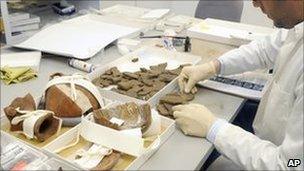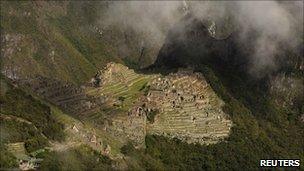Yale agrees to return Machu Picchu artefacts to Peru
- Published

The agreement ends a long dispute over the ownership of the artefacts
Yale University has signed an agreement to return to Peru some 5,000 Inca artefacts removed from the famed Machu Picchu citadel nearly a century ago.
The relics - stone tools, ceramics and human and animal bones - will be housed in a new centre in the city of Cuzco.
The deal ends a long dispute over the artefacts, which were taken from Machu Picchu by American explorer Hiram Bingham in 1912.
Machu Picchu, high in the Andes, is Peru's main tourist attraction.
"This agreement ensures the expanded accessibility of these Machu Picchu collections for research and public appreciation in their natural context," Yale President Richard Levin said.
Victor Raul Aguilar, rector of San Antonio Abad University in Cuzco, said he hoped that "all who visit Machu Picchu will enrich their experience and understanding of Inca culture with a visit to the centre".
The International Centre for the Study of Machu Picchu and Inca Culture will be jointly run by the US and Peruvian universities.
Peru had argued during the dispute that the artefacts were lent in 1911 but never returned. It filed a lawsuit against Yale in 2008.

Machu Picchu is Peru's most important archaeological site
Yale had said that it returned those relics which it borrowed, while it had full ownership of many others.
It also took protest marches and a letter penned by Peruvian President Alan Garcia to his US counterpart Barack Obama to win the battle over the artefacts, the BBC's Dan Collyns in Lima reports.
The relics will be yet another draw for hundreds of thousands of tourists who visit the 15th Century Inca site every year, our correspondent adds.
- Published21 November 2010